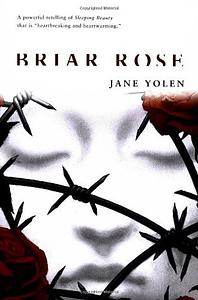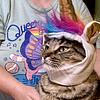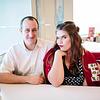You need to sign in or sign up before continuing.
Take a photo of a barcode or cover
Rebecca, or Becca, is the youngest of three sisters, and has always been captivated by her grandmother Gemma's unusual version of Briar Rose, or Sleeping Beauty. Even after her older sisters got sick of hearing it, she would ask her grandmother to tell it. So when her grandmother claims to actually have been Briar Rose on her deathbed, making Becca promise to find out the truth about her family background and the castle she came from, the rest of the family, especially her sisters, are scornful and disbelieving. As Becca starts looking into her grandmother's past, she realizes that no one in the family really knew who Gemma was, or where she came from.
Aided by the handsome editor at the independent newspaper where she works, Becca starts looking into her grandmother's past, and the claims that her story of Briar Rose is true. Her quest to find her family's origins take her to first through refugee records in the US, then to Europe, and Poland, and the remains of the concentration camps of the Second World War.
I love me a good fairy tale retelling. This one is more creative and better than most that I've read. Normally these retellings are fantasy, this is not one of those books. Be warned that this is not an easy read, and while this is a fictional account, the remains of the death camp that Rebecca finds in the idyllic village of Chelmno in Poland, and the stories of what went on there, are all too real. The Sleeping Beauty story that Gemma tells is very clearly a loose metaphor for the terrifying atrocities perpetrated there during the war, and it's clear that Becca's grandmother survived against all odds.
Set in a time which will have been more or less contemporary when the book was released in 1992, it's even more of a historical novel now, when the collapse of the Soviet Union and Communist Poland is almost a distant memory. It gives us insight into not only the terrifyingly efficient and systematic persecution of the Jews by the Nazis, but also that of the homosexuals, Gypsies, and anyone else who didn't fit into their vision for the Third Reich. Not all the concentration camps were for the Jews, and not all of them were places were death camps. There were also the hard labour camps, where obscene medical experiments were performed on the prisoners. Recent historical research has shown that there were a lot more camps than we previously suspected, and the extermination machinery of the Nazis was a lot more wide-spread and gruesome than anyone could have believed. Books like this are necessary so coming generations can learn about the horror, and so that we never repeat our mistakes.
Aided by the handsome editor at the independent newspaper where she works, Becca starts looking into her grandmother's past, and the claims that her story of Briar Rose is true. Her quest to find her family's origins take her to first through refugee records in the US, then to Europe, and Poland, and the remains of the concentration camps of the Second World War.
I love me a good fairy tale retelling. This one is more creative and better than most that I've read. Normally these retellings are fantasy, this is not one of those books. Be warned that this is not an easy read, and while this is a fictional account, the remains of the death camp that Rebecca finds in the idyllic village of Chelmno in Poland, and the stories of what went on there, are all too real. The Sleeping Beauty story that Gemma tells is very clearly a loose metaphor for the terrifying atrocities perpetrated there during the war, and it's clear that Becca's grandmother survived against all odds.
Set in a time which will have been more or less contemporary when the book was released in 1992, it's even more of a historical novel now, when the collapse of the Soviet Union and Communist Poland is almost a distant memory. It gives us insight into not only the terrifyingly efficient and systematic persecution of the Jews by the Nazis, but also that of the homosexuals, Gypsies, and anyone else who didn't fit into their vision for the Third Reich. Not all the concentration camps were for the Jews, and not all of them were places were death camps. There were also the hard labour camps, where obscene medical experiments were performed on the prisoners. Recent historical research has shown that there were a lot more camps than we previously suspected, and the extermination machinery of the Nazis was a lot more wide-spread and gruesome than anyone could have believed. Books like this are necessary so coming generations can learn about the horror, and so that we never repeat our mistakes.
On the whole, I really enjoyed Briar Rose. While I found the first part of the book charming, it was also awkward at times. It seemed like Yolen was trying a bit too hard to be "hip" for the YA crowd. My favorite lines detailed when the main character flipped through her 36 cable channels and only found soft-core movies to watch, one of which she'd already seen. Um... what?? Anywho, I thought the second half of the book was amazing. Not to give too much away, but reading about how groups of people other than the Jews were victimized, tortured, and slaughtered was a powerful experience. My state has recently pushed through some very hateful legislation against the LGBT community and the similarities, the "could this sort of thing happen heres?" were disturbingly possible. I very much liked this fairy tale/not fairy tale. Kudos to Yolen for another powerful book about the Holocaust.
This book gave a very different perspective to the Holocaust. It was a little bit odd, but I enjoyed it. I think I hadn't known before this that homosexuals were also placed in camps. It just gave me something to think about.
Jane Yolen has written over 365 books, so you could read one outstanding story that she wrote each day for a year. This is one of the best.
Powerful and horrible, yet beautiful as well. This had some details of the Holocaust that I had never heard before. I was anxious for the mystery of Gemma's past to be solved, and it seemed like I had to wait a long time in the book for it to happen. When it did, it was worth the wait and much more than I had imagined. Yolen's use of the Sleeping Beauty fairy tale to tell a story of the Holocaust was masterfully done. I thought this quote from the book was particularly appropriate and can be applied to many fairy tales: "It ends happily, even though it's awfully sad along the way."
Note: Some adult themes are dealt with in this story, including some of the horrible violence done in concentration camps and extermination camps during the Holocaust.
Note: Some adult themes are dealt with in this story, including some of the horrible violence done in concentration camps and extermination camps during the Holocaust.
So recommendations for this book have been popping up everywhere for me, so i finally picked up a copy. It's a sad take on the sleeping beauty story and a horrifyingly realistic look at the camps in WWII Poland. Not a favorite of mine but i'm sure it will stick with me.
This premise is slightly counterintuitive, I'll admit that from the start. Fairy tales don't generally seem from the outset as though they'd fit well into recent history, and the contrasts in subject matter can be a bit jarring. But Jane Yolen, an author experienced at her craft, makes the book work with her carefully drawn characters and emphasis on the subjectivity of truth when it comes to the past. Not my favorite adaptation of a fairy tale, but fascinating.
This is a book I've read multiple times. I've always had a place in my heart for the Holocaust ever since I was in middle school and I believe this was the first (if not one of the first) book(s) I read featuring the Holocaust. It's much like life, but even at the end of this story, the author brings it home stating the fact that there is no known woman to have escaped from Chelmno. Even though I know this book makes me sad, I still pick it up time and time again.
I wish the writing in the first half was a little better but the second half was so much better



